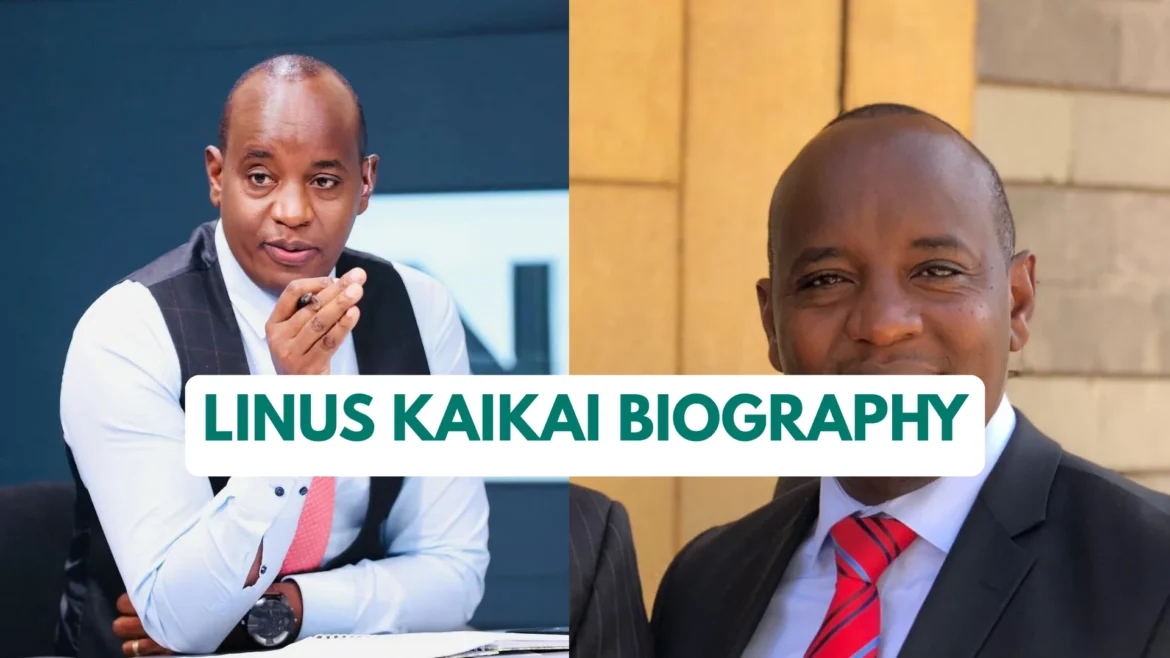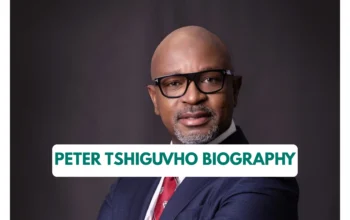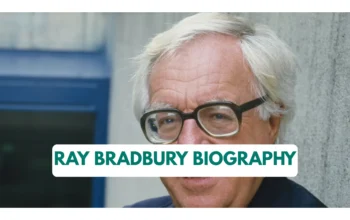Linus Kaikai is a prominent journalist and media executive known across Africa for his incisive reporting, leadership in broadcast media, and commitment to journalistic standards.
Over decades he rose from frontline reporting to strategic leadership roles, shaping newsrooms and influencing public discourse. This biography explores his early life, education, career highlights, awards, leadership style, controversies and legacy.
Whether you’re researching media personalities or studying African journalism, Linus Kaikai’s story offers lessons in persistence, ethics, and media innovation.
Bio Data
- Full Name: Linus Joe Kaikai
- Born: December 2, 1968
- Age: ~56 years (as of 2025)
- Birthplace: Transmara, Narok County, Kenya
- Nationality: Kenyan
- Occupation: Journalist, Media Executive
- Religion: Christian (per some sources)
- Parents: Not publicly known / unavailable
- Siblings: He is the sixth of ten children (4 brothers, 5 sisters)
- Spouse: Jacinta Mueni
- Children: Three (two sons and a daughter)
- Net Worth: Estimated at ~KSh 70 million according to some sources
Early Life and Education
Linus Kaikai’s early life laid the foundation for his career in journalism. Growing up with a curiosity about current events and a strong interest in storytelling, he pursued formal education that prepared him for the newsroom. Key formative influences included local community life, early reading and debate, and mentors who encouraged critical thinking.
Kaikai pursued higher education that combined communication, media studies, or related disciplines (specific degrees vary by source). His studies equipped him with theoretical knowledge and practical skills—report writing, interviewing techniques, and media ethics—that would be essential throughout his career.
Early Career: From Reporter to Anchor
Linus Kaikai began his journalism career on the ground, covering stories that mattered to everyday people. His early roles involved reporting, fieldwork, and producing news segments. Kaikai’s reporting style—clear, authoritative, and sensitive to context—helped him stand out.
As his reputation grew, he transitioned to presenting and anchoring, developing a calm on-air presence and the ability to moderate complex discussions. This phase tested his ability to balance neutrality with incisive questioning, and it also expanded his public profile.
Rise into Editorial and Executive Leadership
Kaikai’s evolution from reporter and presenter into editorial leadership marked a major shift. He assumed roles with increasing responsibility—news editor, managing editor, and eventually senior executive positions. In these roles he guided editorial policy, newsroom ethics, and strategic direction.
Under his leadership, newsrooms often emphasized accuracy, fact-checking, and credible sourcing. Kaikai championed initiatives to professionalize journalism, invest in training, and adopt new technologies—helping broadcasters adapt to digital disruption and changing audience habits.
Notable Positions and Contributions
Throughout his career, Linus Kaikai has held influential positions in major broadcasting organizations across the continent. These roles included editorial leadership and executive responsibilities where he influenced programming, editorial standards, and organizational growth. His contributions include:
- Strengthening newsroom governance and editorial oversight.
- Expanding news coverage to include in-depth investigative pieces.
- Advocating for journalist safety and ethical reporting standards.
- Mentoring younger journalists and promoting capacity-building programs.
He is often credited with pushing for content that served public interest while maintaining commercial viability—balancing quality journalism with audience demands.
Major Stories and Journalistic Impact
Kaikai reported on and guided coverage of many high-impact stories, ranging from political transitions to social issues. His editorial decisions shaped how audiences understood major events. He emphasized context, historical perspectives, and careful verification—qualities that improved public trust in the outlets he led.
His approach to journalism often encouraged thoughtful debate rather than sensational reporting, which helped elevate public discourse during tense political moments and critical national conversations.
Awards, Recognition, and Professional Affiliations
Over the years, Linus Kaikai has been recognized for his commitment to journalism and leadership. Awards and professional recognitions highlight both his reporting skills and his capacity to lead media organizations through change. He has also participated in professional associations, conferences, and panels—sharing best practices and advocating for press freedom.
Leadership Style and Values
Kaikai’s leadership is characterized by clarity, accountability, and mentorship. He values:
- Editorial independence and ethical journalism.
- Investment in training and newsroom development.
- Transparent decision-making and respect for diverse viewpoints.
- Resilience in the face of political or economic pressures.
Colleagues often describe him as principled, pragmatic, and committed to upholding standards even when facing external pressures.
Challenges and Controversies
Like many senior journalists and media executives, Kaikai’s career has encountered challenges. These include navigating political sensitivities, economic constraints on media houses, and the ethical complexities of modern reporting. Where controversies arose, they typically centered on editorial decisions or disputes that accompany high-profile news coverage. Kaikai’s response to such challenges—often emphasizing facts, transparency and corrective measures—shaped public perceptions of his leadership.
Legacy and Influence
Linus Kaikai’s legacy is built on strengthening institutions and elevating the practice of journalism. Through mentorship, editorial reform, and a focus on training, he has influenced a generation of journalists. His emphasis on ethical reporting, newsroom resilience, and adapting to digital trends positions him as a model for media leadership in a dynamic media landscape.
Personal Life (Where Publicly Known)
Where publicly available, details of Kaikai’s personal life—such as family or hobbies—are shared sparingly, reflecting either his preference for privacy or limited public disclosure. What is clear is his enduring commitment to journalism and to building newsrooms that can serve the public interest.
FAQs
Who is Linus Kaikai?
Linus Kaikai is a respected journalist and media executive known for his editorial leadership and influence in African broadcasting.
What positions has Linus Kaikai held?
He has worked as a reporter, anchor, editor and senior media executive within major broadcasting organizations, overseeing editorial policy and newsroom strategy.
What is Linus Kaikai best known for?
His dedication to journalistic standards, newsroom leadership, mentoring of young journalists, and contributions to broadcast media innovation.
Has Linus Kaikai won awards?
Yes — across his career he has received recognitions tied to journalism excellence and leadership (individual awards vary by source).
Is Linus Kaikai active on social media?
Many senior journalists maintain public profiles to share insights; check verified platforms for his official accounts.
What values does Kaikai emphasize?
Editorial independence, accuracy, transparency, and journalist training.
Has Kaikai been involved in controversies?
Like many public media figures, he has faced challenges and disputes related to editorial choices; his responses typically emphasize accountability and ethics.
Where can I read more about his work?
Look to major broadcasters’ archives, journalism conference proceedings, and reputable media profiles for detailed articles and interviews.
Conclusion
Linus Kaikai’s biography is a testament to a career built on journalistic rigor, leadership, and service to the public sphere. From frontline reporting to newsroom stewardship, his influence stretches across editorial policy, journalist mentorship, and the ethical evolution of broadcast media. For students of media, journalists, and curious readers, Kaikai’s journey offers a clear example of how principled leadership can strengthen institutions and elevate public conversation.




